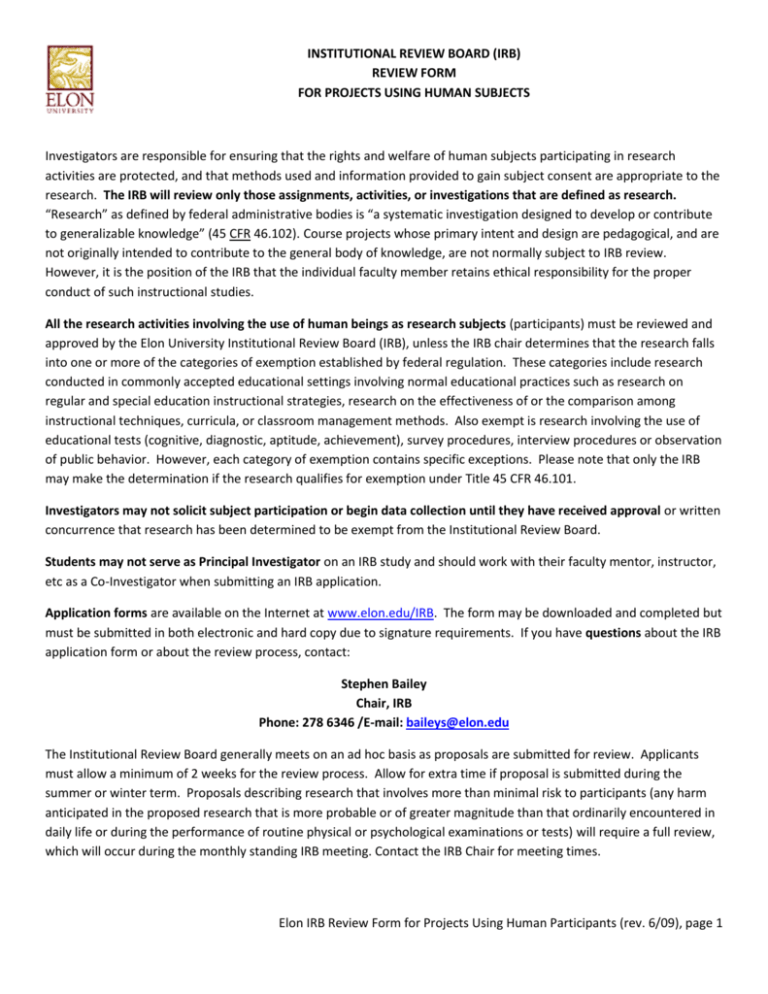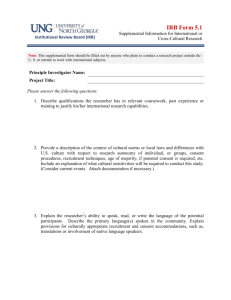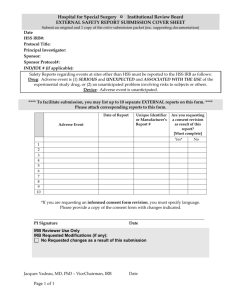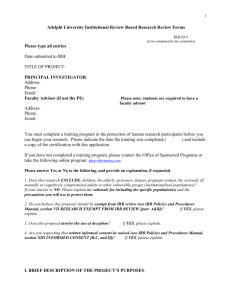IRB Proposal Example for Unnamed Sources
advertisement

INSTITUTIONAL REVIEW BOARD (IRB) REVIEW FORM FOR PROJECTS USING HUMAN SUBJECTS Investigators are responsible for ensuring that the rights and welfare of human subjects participating in research activities are protected, and that methods used and information provided to gain subject consent are appropriate to the research. The IRB will review only those assignments, activities, or investigations that are defined as research. “Research” as defined by federal administrative bodies is “a systematic investigation designed to develop or contribute to generalizable knowledge” (45 CFR 46.102). Course projects whose primary intent and design are pedagogical, and are not originally intended to contribute to the general body of knowledge, are not normally subject to IRB review. However, it is the position of the IRB that the individual faculty member retains ethical responsibility for the proper conduct of such instructional studies. All the research activities involving the use of human beings as research subjects (participants) must be reviewed and approved by the Elon University Institutional Review Board (IRB), unless the IRB chair determines that the research falls into one or more of the categories of exemption established by federal regulation. These categories include research conducted in commonly accepted educational settings involving normal educational practices such as research on regular and special education instructional strategies, research on the effectiveness of or the comparison among instructional techniques, curricula, or classroom management methods. Also exempt is research involving the use of educational tests (cognitive, diagnostic, aptitude, achievement), survey procedures, interview procedures or observation of public behavior. However, each category of exemption contains specific exceptions. Please note that only the IRB may make the determination if the research qualifies for exemption under Title 45 CFR 46.101. Investigators may not solicit subject participation or begin data collection until they have received approval or written concurrence that research has been determined to be exempt from the Institutional Review Board. Students may not serve as Principal Investigator on an IRB study and should work with their faculty mentor, instructor, etc as a Co-Investigator when submitting an IRB application. Application forms are available on the Internet at www.elon.edu/IRB. The form may be downloaded and completed but must be submitted in both electronic and hard copy due to signature requirements. If you have questions about the IRB application form or about the review process, contact: Stephen Bailey Chair, IRB Phone: 278 6346 /E-mail: baileys@elon.edu The Institutional Review Board generally meets on an ad hoc basis as proposals are submitted for review. Applicants must allow a minimum of 2 weeks for the review process. Allow for extra time if proposal is submitted during the summer or winter term. Proposals describing research that involves more than minimal risk to participants (any harm anticipated in the proposed research that is more probable or of greater magnitude than that ordinarily encountered in daily life or during the performance of routine physical or psychological examinations or tests) will require a full review, which will occur during the monthly standing IRB meeting. Contact the IRB Chair for meeting times. Elon IRB Review Form for Projects Using Human Participants (rev. 6/09), page 1 A notice of the IRB’s action will be sent to the researcher(s). It is the responsibility of the researcher(s) to see that the form is given to any agency which may require it. Title 45 Code of Federal Regulations Part 46 (45 CFR 46) Protection of Human Subjects specifies federal regulations for the conduct of research involving human subjects. See especially sections 46.102 Definitions, 46.116 General Requirements for Informed Consent, and 46.117 Documentation of Informed Consent. The document is available at http://ohrp.osophs.dhhs.gov/humansubjects/guidance/45cfr46.htm. See references throughout this application to 45 CFR 46. INSTRUCTIONS: Your responses to the 20 questions in the summary sheets that follow are basic to the Institutional Review Board’s determination about the protection of the rights and welfare of human subjects in your research. Your responses should be clear, complete, and easy to understand. Place your typewritten response immediately under each question (not on a separate sheet). It is important that you answer every question. If you believe that a question does not apply to your research, enter a response such as “N/A” or “does not apply.” Copies of the following must be included with this form: 1. The letter/script that will be used to inform participants of the nature of the research. 2. The informed consent template the subject(s) will sign (samples appropriate to behavioral and biomedical research are available at www.elon.edu/IRB). 3. Copies of surveys, instruments or measures, questionnaires, interview schedules, focus group questions and/or other materials used to collect data. Submit one complete hard copy and one digital copy (as a .docx or .pdf file, via e-mail or disk) to: Stephen Bailey Chair, IRB 2085 CB (baileys@elon.edu) Elon IRB Review Form for Projects Using Human Participants (rev. 6/09), page 2 Title Page: Review Form for Projects Using Human Subjects For office use only PROTOCOL NUMBER: PROTOCOL TYPE: Elon University Research Project Title Exempted Expedited Full Click here to enter text. Principal Investigator Name (first, middle initial, last): Campus Box/Phone: Click here to enter text. Click here to enter text. Department: E-mail: Click here to enter text. Click here to enter text. Signature:Click here to enter text. Fax: Note: Students cannot serve as PI University Relationship: (Professor, Associate Professor, Assistant Professor, Instructor, Other (please specify) Click here to enter text. (“Other” categories may require prior approval.) Click here to enter text. Date:Click here to enter text. Co-Investigator Name (first, middle initial, last): Campus Box/Phone: University Relationship: (Faculty, Staff, Graduate Student, Undergraduate Student, Other (please specify)) Click here to enter text. Click here to enter text. Department: E-mail: Click here to enter text. Click here to enter text. Click here to enter text. Signature:Click here to enter text. Fax: Click here to enter text. Date:Click here to enter text. IF MORE THAN ONE CO-INVESTIGATOR, PROCEED TO NEXT PAGE Elon IRB Review Form for Projects Using Human Participants (rev. 6/09), page 3 Co-Investigator Name (first, middle initial, last): Campus Box/Phone: University Relationship: (Faculty, Staff, Graduate Student, Undergraduate Student, Other (please specify)) Click here to enter text. Click here to enter text. Department: E-mail: Click here to enter text. Click here to enter text. Assistant Professor Signature: Fax: Date: Co-Investigator Name (first, middle initial, last): Campus Box/Phone: University Relationship: (Faculty, Staff, Graduate Student, Undergraduate Student, Other (please specify)) Click here to enter text. Department: E-mail: Undergradate Student Signature: Fax: Date: Co-Investigator Name (first, middle initial, last): Campus Box/Phone: University Relationship: (Faculty, Staff, Graduate Student, Undergraduate Student, Other (please specify)) Department: E-mail: Undergraduate Student Signature: Fax: Date: NOTE: If more than four co-investigators will be listed, copy box on form and fill in additional information as needed. Elon IRB Review Form for Projects Using Human Participants (rev. 6/09), page 4 Application Questions Please type your responses. INTRODUCTION TO THE PROPOSED RESEARCH 1. Provide the date when you propose to begin research and the date when you anticipate that research will be completed. Proposed start date: Anticipated completion date: 2. Indicate any source(s) of funding for the proposed research i.e., department funds or grants. DESCRIPTION OF THE PROPOSED RESEARCH 3. Provide a brief (1 page or less) description of the purpose of your research. [Insert study-specific information here. Be sure to address parameters of study and major goals] The research design will incorporate a traditional ethnographic toolkit and methodology including immersion in the lives of my research population, This research emphasizes culture rather than individuals. It will involve keeping detailed field notes, using a tape recorder for informal and semi-structured interviews, and photographic equipment to record public life with appropriate permission. The field notes will be taken on a daily basis. The taped interviews will be transcribed and incorporated in my field notes. Interviews will be conducted formally and informally. The semi-structured interviews will evolve from my observations and will include open-ended sets of focused questions. In ethnographic research, the researcher is the primary research instrument. During interviews, questions will be based on the subject’s views and ideas about [add your topic here.] Specific questions cannot be established prior to the ethnographic experience because ethnography is an iterative process. The questions in both formal and informal interviews will evolve through time and will be modified by the research setting. Photographs will be of public behavior of groups of people and/or individuals with the intent for use in research presentations/writing. Photographs will not be associated with a particular individual or emphasize an individual in text or in reference. Approval will always be sought prior to photography. A written consent form will be given to those where photographs include small groups or individuals. The photographs will not put the subjects at risk in any way (see oral informed consent document and photograph consent for visual images). 4. Indicate the setting or location(s) where research will be conducted. Attach letters of support or agreement, as necessary, showing that you have permission to conduct research at that location. If you are interacting with human subjects outside of the United States, describe what procedures are required to adhere to the human subjects mandates for the country where data collection will take place. Fieldwork will be conducted in [add the place(s)]. No formal permission is required for such fieldwork, nor is such permission relevant, as individuals choose to participate or not based on their own interests. [This may or may not be true for your specific site.] Elon IRB Review Form for Projects Using Human Participants (rev. 6/09), page 5 5. Describe any potential problems of ethics using human subjects (painful simulation, deception, coercion, embarrassment, lack of confidentiality, lack of full disclosure, lack of feedback for subjects, etc.). NA 6. Does the proposed research require that you deceive participants in any way? ____ Yes _X__No 7. If your response is “yes,” describe the type of deception you will use, indicate why it is necessary for this study, and provide a copy of the debriefing script. 8. What is required of subjects? Participation is voluntary and differs depending on the person, their role in the community, and their interest in the project. A full list of activities are: interviews, photography, and observation of community life (such as insert specific examples). 9. What happens to subjects (include a description of any instruments used, sample of questionnaires, focus group questions, etc.)? Participants are active members of the community. They are part of this research if they voluntarily agree to talk to researchers and invite them into their lives to observe them in the course of their daily lives. BENEFITS AND RISKS 10. Describe the potential benefits of conducting this research. List the benefits to the participants themselves, contributions to the field of knowledge, and benefits to society as a whole. If the research participants will not receive any direct benefits from participating in this study, indicate this in your response. There are no real or potential benefits to the research population other than the production of documents that are relevant to their culture. Specifically, we will be sending copies of any research papers/presentations developed from this ethnography to any subject who requests this information. In addition, we will be sending pictures to those who were photographed. Our interview schedule is set by community members and all transcripts are returned to the interviewee to vet the information and check on the accuracy of commentary. 11. Describe any potential risks that a research participant may become upset or distressed as a result of their participation in this study. When appropriate, provide a list of community agencies or counseling services so that participants can be directed to assistance as needed. There is no additional risk involved in this study for the research population. [Insert your discipline’s statement of ethics. What follows is an example from the American Anthropological Association.] We are guided by the Elon IRB and the “Statement of Ethics of the American Anthropological Association” which states: “My paramount responsibility is to those involved in the study and everything within my power will be done to protect their physical, social, psychological welfare and to honor their dignity and privacy” (from Podolefsky 1989:214). In all research notes and field notes no individuals will be mentioned by name. All participants are given fictive names and their identities are disguised. In addition, the location of the research is also disguised. Elon IRB Review Form for Projects Using Human Participants (rev. 6/09), page 6 PARTICIPANTS 12. Indicate the total number of participants you require, and your sampling procedure. Ethnographic research depends upon a convenience sample where informants are chosen based on their professed cultural knowledge of a particular topic and a community recognized proficiency in the culture. The researchers will traverse the three stages of participant-observation: entry into the community via both individual initiative and go-betweens within the community, who then introduce the researchers to informants, establishing rapport and understanding the culture. We will then work most closely with key informants who exhibit the most extensive knowledge of the community and who are willing to work with us. While this work does not require a specific number of participants, we expect to talk to between [add number here]. 13. Describe the type and source of subjects required (i.e., single parents at Elon, psychology classes, patients at Alamance Regional Medical Center, sixth graders at Turrentine Middle School, etc.). Please see #10. In particular, we expect to talk to [describe the types of people you plan to talk to.] 14. Provide an estimate of the amount of time that will be requested from each person who participates in this research study (number of sessions, amount of time per session, and duration of period of time over which the research will take place). The time each participant will spend will vary. Some participants may agree to a single, brief interview. Others will become active participants in the research process and work with me throughout the duration of the research. INFORMED CONSENT PROCEDURES 15. Describe what you have done to make sure your subjects are fully informed about their role in the research, that their confidentiality will be maintained, and that their participation is voluntary, and that they can withdraw at any time without penalty. The Alternative Informed Consent Procedure is utilized. Informed consent will be given orally. Generally, ethnography as a field research method employs oral rather than written consent. This is particularly important in cultures where signing documents can be viewed as threatening (see Hunn, Eugene and Rhodes, Lorna 2002. “Human Subjects Review of Ethnographic Fieldwork.” Anthropology News 43(4):21-22). Further, all subjects will be given a written statement describing the project and their rights to withdraw themselves from the study. Finally, a written consent form that ensures confidentiality signed by the researcher will be given to the subject(s) upon request (see oral informed consent document). We will not be identifying individuals by name or image. In cases where the interviewee asks to delete information, we will respect his or her wishes according to the following guidelines: If the speaker asks that what they say remain confidential before they speak, we will stop recording; if the speaker asks that the discussion of certain topics be omitted after the interview has taken place, we will delete those entire sections on the tape and from my notes. 16. Describe any incentives, inducements, or reimbursements (e.g. extra credit, research credit, cash payment, raffle, gift) that will be offered to the participants. Indicate whether participants will receive the incentives if they withdraw before the study has been completed. NA Elon IRB Review Form for Projects Using Human Participants (rev. 6/09), page 7 CONFIDENTIALITY OF THE DATA 17. Indicate the intended use of your data. Check all that apply. _____ Thesis _____ Publication/journal article _____ Capstone ____ Results released to participants/parents _____ Undergraduate honors project _____ Results released to employer or school _____ Conferences/presentations _____ Results released to agency or organization _____Other. Describe below. 18. Describe the steps you will take to insure the confidentiality of the data. Indicate how you will safeguard data that includes identifying or potentially identifying information (e.g. coding). Indicate when identifiers will be separated or removed from the data. An alternative informed consent procedure that is given orally ensures confidentiality, anonymity and overrides the possible linkage of subject to research through an informed consent procedure that is signed by the participant. The oral informed consent will state the reason for conducting research and explain what the possible uses of research in the future could be. However, a document for written consent to use photographs will be included (it follows this proposal). While images are requested for use, to facilitate anonymity names will not be used in text or in verbal presentations. This written consent form for photographs to be used with small groups/individuals and will provide a space for the signature of the researcher and the subject’s signature. 19. Indicate where and how you will store the data and how long you plan to retain it. (Research proposals that involve any type of use of human subjects must be retained for 3 years.) Describe how you will dispose of it (e.g. erasure of tapes, shredding of data). Records will be kept by the researcher indefinitely. Because names are nowhere associated with the data collected, this will cause no harm to any subjects. Records may also be archived with the Program of Ethnographic Research and Community Studies at Elon University. A PERCS consent form signed by the researcher will accompany the archiving of research materials. 20. Will results of this research be made available to the subjects involved? __X___ Yes _____ No 21. If so, how and when? A copy of any papers, presentations, photographs or publications will be mailed to all of the participants who took part in the research upon request. Should anyone request any type of additional feedback, such as updates on the progress of the research, this will be provided on an individual basis. Elon IRB Review Form for Projects Using Human Participants (rev. 6/09), page 8 Introduction to Alternative, Oral Consent Form Procedure The following consent form is based on the principle of an alternative informed consent procedure. We ask that the Elon IRB waive the requirement to obtain a signed consent form for several reasons. First, we are interested in preserving the integrity of the ethnographic field situation with as little disruption to the lives of the research population (rather than subjects) as possible. An informed consent form with the requirement for signature in an ethnographic setting of (fill in your setting here) would be disruptive to the daily cultural routine and an inappropriate burden on the research population. Secondly, in maintaining the standards for protection for research participants, a written informed consent form would provide a clear linkage of individuals to data (Code of Federal Regulations 2001: 18). It is preferable that there is no documentation linking individuals to data. The researcher will read aloud the oral informed consent information below, and will provide a signed copy (by the researcher) of this information upon request of the participant.. In all research notes and field notes no individuals will be mentioned by name. All participants are given fictive names and their identities are disguised. Finally, as with much anthropological research, my research in focused on culture not individuals (Hunn and Rhodes 2002:22) Elon IRB Review Form for Projects Using Human Participants (rev. 6/09), page 9 Oral Informed Consent [Title of your project] I am asking for your help in my research of (topic) entitled: (title of project). My name is (name) and I am a student at Elon University in North Carolina. Any information I might gather while observing and participating in your lives, and or acquire through questioning or interviews is purely voluntary. At any time you may refuse to participate or withdraw. Your cooperation and help with my research on (topic) will not result in any financial benefits. I want to tell you more about my research so you can decide whether you want to participate. If you desire, you will be given a copy of the information I am giving to you orally that is signed by me explaining that I will respect your privacy and provide you anonymity in my research. Please feel free to ask any questions that you may have at any time. The purpose of my visit to (research site) is to conduct anthropological research using a method called participant-observation. My research will focus on (topic). Your knowledge about life in/among (the group you are working with) will be very valuable to my research. The research will primarily look at (longer and more specific articulation of your research topic). If you decide to collaborate, you will be among your fellow (group) members who also decided to be a part of this study. Your participation will last as long or short as you feel comfortable; the entire study will last for (duration of study). During this course of study, the following will occur: I will be around (site, location, venue) periodically learning as much as I can about your culture through observation of public behaviors, asking questions, interviews, and taking photographs (with your permission). There are no potential risks or benefits if you choose to participate. You are also guaranteed anonymity in this research study and/or future research presentations/writing. The name of the (decide what is appropriate: i.e. region in US, city, etc.) will be disclosed, although your name and your (decide what is appropriate: e.g. town, city etc.) will not be. A copy of any papers, presentations, photographs or publications will be mailed to you upon request. Should you request any type of additional feedback, such as updates on the progress of the research, this will be provided on an individual basis. Your written permission will be requested for my use of any photographs in my research presentations/text. This research neither costs anything nor will pay anything should you choose to participate. If you have any questions I can be reached at: (school and home address and phone, email) I, (researcher’s name), agree to abide by the statements in this document. _____________________________________ ________________ Signature Date Elon IRB Review Form for Projects Using Human Participants (rev. 6/09), page 10







